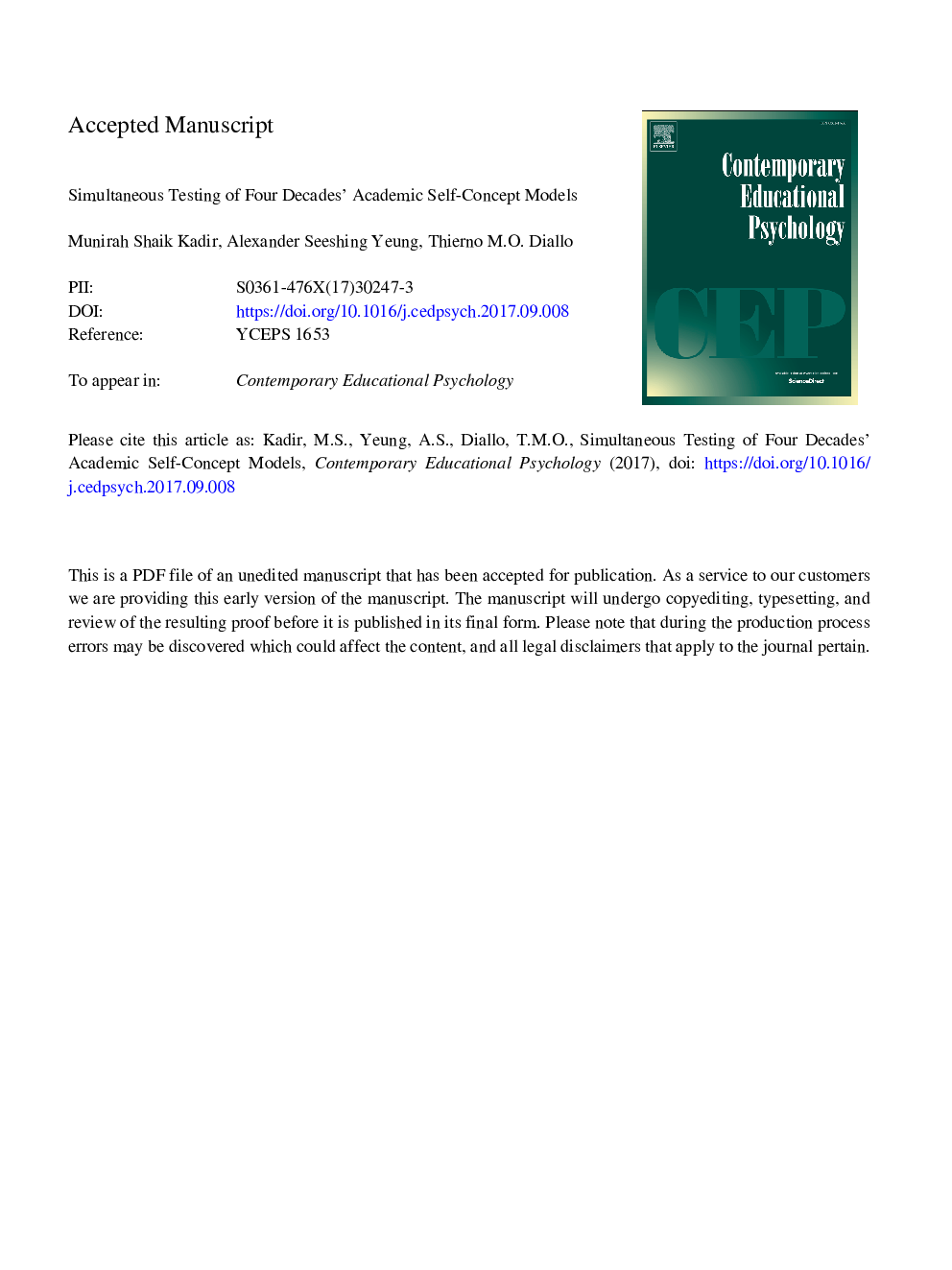| کد مقاله | کد نشریه | سال انتشار | مقاله انگلیسی | نسخه تمام متن |
|---|---|---|---|---|
| 6839745 | 1434668 | 2017 | 66 صفحه PDF | دانلود رایگان |
عنوان انگلیسی مقاله ISI
Simultaneous testing of four decades of academic self-concept models
ترجمه فارسی عنوان
تست همزمان چهار دهه از مدل های خودکشی دانشگاهی
دانلود مقاله + سفارش ترجمه
دانلود مقاله ISI انگلیسی
رایگان برای ایرانیان
کلمات کلیدی
خودآموزی تحصیلی، صلاحیت، تاثیر می گذارد، ویژگی دامنه، چارچوب مرجع، اثرات متقابل، همبستگی،
ترجمه چکیده
در مطالعات جداگانه درباره خودپردازی آکادمیک، تحقیقات گذشته نشان داده است: (1) تمایز یک مولفه شناختی و عاطفی، (2) ویژگی دامنه مفاهیم خود، (3) اثرات متقابل خودپنداره و پیشرفت (4) فریم مرجع داخلی / خارجی در توسعه خودمختار، (5) اثرات متقابل مرجع داخلی / خارجی مرجع، (6) اثر ماهی بزرگ ماهی، و، (7) همبستگی مفاهیم خود در حوزه های مشابه. این مطالعه نشان می دهد که تمام این هفت یافته قابل تکثیر است و ممکن است در یک مطالعه تکین با نمونه ای از دانش آموزان سنگاپور سنتز شود. 1 دانشآموز متوسطه (7 گریدر، 275 نفر) با 24 مورد درباره مفاهیم خودکفائی خود در فیزیک، انگلیسی و ریاضی در دو جزء (شناختی و عاطفی) مورد بررسی قرار گرفت و نمرات دستاوردهای مربوط به آنها در دو نقطه زمان ثبت شد. تحلیل عاملی تاییدی نشان داد که مولفه های شناختی و عاطفی خودمفهومی دانشگاهی جداگانه هستند. مفاهیم خودآموزی دانشجویان در حوزه های مختلف برنامه درسی متمایز بود، و حامی ویژگی خاصی از مفاهیم خود بود. چهارچوب مرجع و اثرات متقابل هر دو پشتیبانی می شود، اما فقط برای مولفه شناختی خودکفایی. همبستگی مثبت و آماری بین فیزیک و ریاضی نشان می دهد که این حوزه های درسی برنامه درسی با یکدیگر ارتباط دارند. نتایج مطالعات خودپنداره در مدارس می تواند طراحی مداخلات را تقویت و هدایت کند که می تواند خود-مفاهیم دانش آموزان را برای تأثیر مثبت پایدار بر نتایج آموزشی مطلوب تقویت کند. تلاش برای بهبود نتایج یادگیری باید به افزایش مولفه های خاصی از خودپنداری دانشگاهی در حوزه های درسی خاص و مربوط به برنامه های درسی برای اثرات بهینه کمک کند.
موضوعات مرتبط
علوم انسانی و اجتماعی
روانشناسی
روان شناسی کاربردی
چکیده انگلیسی
In separate studies on academic self-concept, previous research has shown: (1) the distinctiveness of a cognitive and an affective component, (2) the domain specificity of self-concepts, (3) the reciprocal effects of self-concept and achievement, (4) the internal/external frame of reference in self-concept development, (5) the reciprocal effects of the internal/external frame of reference, (6) the big-fish-little-pond effect, and (7) the interrelatedness of self-concepts in similar domains. The present study demonstrates that all of these seven findings are replicable and may be synthesized in a single study with a sample of students in Singapore. Secondary 1 students (7th graders; N = 275) were surveyed with 24 items about their academic self-concepts in physics, English, and math in two components (cognitive and affective), and their respective achievement scores were recorded over two time points. Confirmatory factor analysis found that the cognitive and affective components of academic self-concept were separable. The students' self-concepts in different curriculum domains were distinct, supporting the domain specificity of self-concepts. The frame of reference and reciprocal effects were both supported, but only for the cognitive component of self-concept. Positive and statistically significant correlations between physics and math suggest that these curriculum domains were interrelated. Results of self-concept studies in schools can encourage and guide the design of interventions that could enhance students' self-concept for positive sustainable effects on desirable educational outcomes. Attempts to improve learning outcomes should emphasize an enhancement of specific components of academic self-concept in domain-specific and related curriculum domains for optimal effects.
ناشر
Database: Elsevier - ScienceDirect (ساینس دایرکت)
Journal: Contemporary Educational Psychology - Volume 51, October 2017, Pages 429-446
Journal: Contemporary Educational Psychology - Volume 51, October 2017, Pages 429-446
نویسندگان
Munirah Shaik Kadir, Alexander Seeshing Yeung, Thierno M.O. Diallo,
